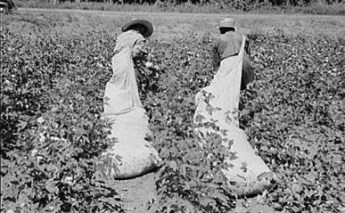Poetry Friday : February 3, 2017.
But the Egyptians mistreated and oppressed us,
assigning us a burdensome labor.
–Deuteronomy 26:6

There was a magic number–
Seventy bolls make a pound,
Seven thousand make a hundred.
A hundred pounds of feathers,
A hundred pounds of lint dust,
A hundred pounds of cotton in a day.
Reaching past the branches
Into the cotton flower,
Pulling walnut-sized bolls
From barbed, five-pointed cockle-burs.
Seven thousand times
For a hundred pounds a day.
Repetitive picking motion,
Backbreaking stoop labor,
Cramped hands, fingers locked in place,
Mind-numbing and endless
Sunup to sundown picking
A hundred pounds each day.
© 2016 Alice Nine, a found poem from The Warmth of Other Suns by Isabel Wilkerson
February is National African American History month.
 Isabel Wilkerson’s The Warmth of Other Suns weaves back and forth across time and our land, telling the compelling true stories of the hope and longings of three young people who fled the South, each in a different decade during the Great Migration when six million African-Americans left their homes for the North and West. This is the little-known story of the greatest migration of people within the borders of a single country. It is an untold part of American history.
Isabel Wilkerson’s The Warmth of Other Suns weaves back and forth across time and our land, telling the compelling true stories of the hope and longings of three young people who fled the South, each in a different decade during the Great Migration when six million African-Americans left their homes for the North and West. This is the little-known story of the greatest migration of people within the borders of a single country. It is an untold part of American history.
In Isabel Wilkerson’s words, in her description of the hard labor of cotton picking, I found my poem.

What is a found poem?
Read about it HERE.
 Penny at A Penny and Her Jots is hosting the Poetry Friday Roundup today. Thank you, Penny!
Penny at A Penny and Her Jots is hosting the Poetry Friday Roundup today. Thank you, Penny!
If you’d like to know more about Poetry Friday, click HERE for an explanation by Renee LaTulippe.

Thanks for sharing your beautiful found poem. I didn’t know about Warmth of Other Suns. It sounds very interesting.
It is, on all levels.
I’m listening to UNDERGROUND RAILROAD. Your poem resonates.
🙂
What a fascinating book – I must confess I still know so little about American history beyond the famous names and major dates. So many powerful stories still to discover and explore.
If you’ve not read it, Jane, you should. So much history from different points of view and different settings converging in one book.
Thank you for sharing the book and the poem you found within its words. My family grew cotton, but it was in the days of automatic picking machines. I do have fond memories of jumping off the sides of the trailer to land in piles of fluffy cotton bolls, but I can’t imagine the torture of picking by hand.
Your comment made me think of point of view. In your memory, cotton is soft and fluffy piles to jump in. For the picker, cotton had to be freed from the barbed five-pointed bolls that tore at hands. And since work was measured by the weight of the gathered cotton, though cotton is soft and fluffy, a 100-pound bag is 100 pounds. Thanks for stopping by and commenting, Kay.
Such a great juxtaposition of the quote and poem. Brings new depth to the phrase Bugs Bunny uses from 1952: “Now wait just a cotton-picking minute.” I always believed that was simply racist, like in this article: https://www.bustle.com/articles/118386-5-racist-english-phrases-with-a-seriously-awful-history. But if the act of picking the cotton is actually dangerous and painful, that makes the phrase itself even more curious when combined with “minute”. Wait a painful, difficult, forced-labor minute. It’s quite aggressive a phrase, isn’t it? Our language hides such layers of meaning. I find it fascinating.
Thanks for sharing the bustle.com link. Fascinating. And what about “keep your cottom-picking hands off/out of …” ?
Yes! Clearly bad overtones in that one, too.
🙁
I’m reading the Warmth of Other Suns too. What a great read. Your found poem adds to my thinking.
Yes! I read it last year, but it’s a book that I continually read–pick up and re-read passages that provoke my thinking and open my eyes and heart.
When my mother and sister first moved to Tennessee, they lived by a cotton farm. I remember taking my children to see it because we only grow corn and beans in Indiana! Cotton fields were foreign to all of us. I can’t even imagine the hard labor of picking cotton. You have certainly picked out the words and phrases which describe it. This book looks like a very good read. Thank you for the recommendation.
It is a very good read on several levels.
Thanks for the book share, too. I’ve read about that cotton picking, and my son now lives in Texas, and there are cotton fields. So we stopped and I reached in to pick a few bolls. Yes, it hurts, and yes there are so many thorns. Hard to imagine how the workers managed those 7,000 times. Well done, Alice!
Thank you, Linda. I can’t imagine 7,000 times! It says a lot about the grueling nature of such work.